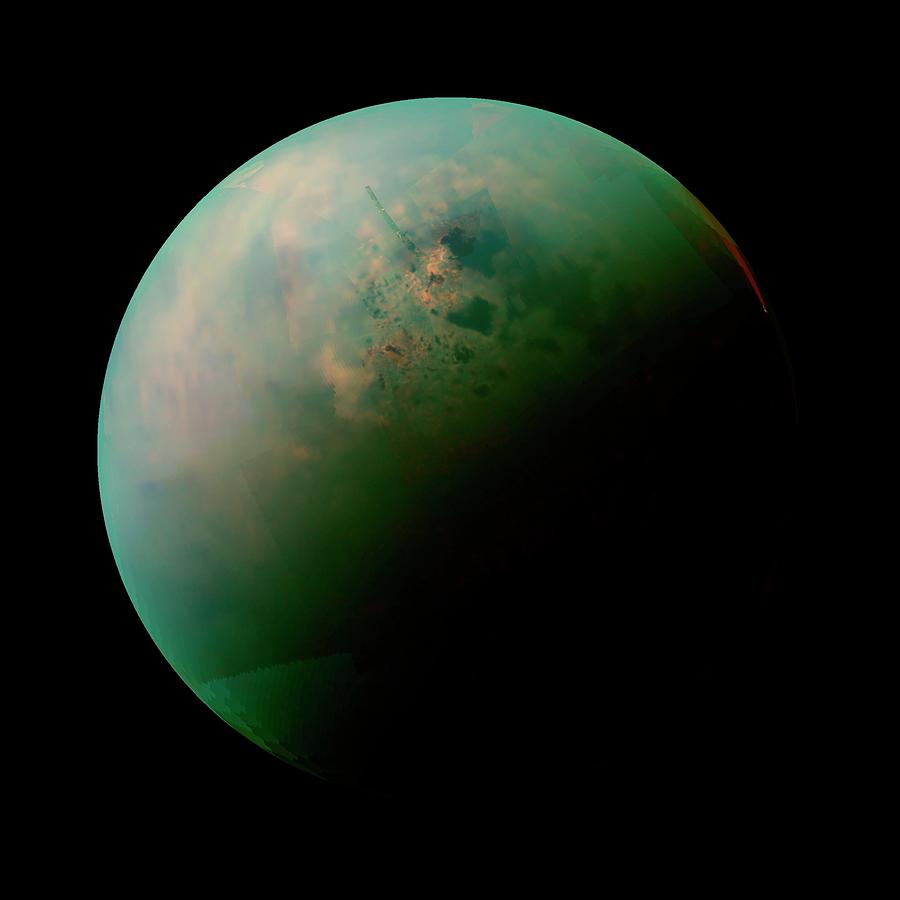Titan: A World Where It Rains Gasoline
Let us all see the mysteries of Titan, Saturn’s largest moon, where icy landscapes, thick orange clouds, and vast methane lakes create an alien world unlike any other.

A Strange and Exotic World
Titan is the largest of Saturn’s moons and the second-largest moon in the solar system, trailing only behind Jupiter’s Ganymede. It is unique among moons for having a dense atmosphere, composed primarily of nitrogen with traces of methane and other hydrocarbons. Due to its thick orange haze, scientists long suspected that Titan could host liquid on its surface, and this was confirmed by NASA’s Cassini-Huygens mission, which explored the Saturnian system between 2004 and 2017.
Unlike Earth, where water is the dominant liquid, Titan's surface temperatures average a frigid -290°F (-179°C). At such temperatures, water exists only as rock-hard ice, while hydrocarbons like methane and ethane can exist in liquid form. These chemicals rain down from Titan’s thick clouds, forming rivers, lakes, and seas. The largest of these liquid bodies, Kraken Mare, is comparable in size to the Caspian Sea on Earth.
An Alien Hydrological Cycle
Just as water evaporates, forms clouds, and returns as precipitation on Earth, Titan has a similar cycle—except it revolves around methane and ethane. Scientists have observed seasonal changes in Titan’s weather, with evidence of storms that reshape its landscape. The presence of vast liquid bodies suggests an active and dynamic climate, one that might even support exotic forms of prebiotic chemistry.
NASA’s Cassini spacecraft detected evidence of waves on the liquid surfaces, and radar imaging confirmed that some of the lakes have depths of over 300 feet (100 meters). Additionally, clouds of methane have been spotted drifting across the sky, suggesting an active atmosphere that replenishes Titan’s hydrocarbon rain.
Could There Be Life?
Titan has long intrigued astrobiologists because of its rich organic chemistry. While its extreme cold and lack of liquid water make life as we know it unlikely, some scientists speculate that exotic, methane-based life forms could theoretically exist in its lakes. Unlike Earth-based life that depends on water, hypothetical Titanian organisms might use methane as a solvent for biochemical reactions.
In 2015, NASA researchers proposed the possibility of cell-like structures forming in Titan’s methane seas, composed of nitrogen-based membranes rather than phospholipids (which form cell walls on Earth). While no direct evidence of life has been found, future missions aim to explore Titan’s chemistry in greater detail.
Future Exploration: The Dragonfly Mission
NASA has set its sights on Titan with the upcoming Dragonfly mission, expected to launch in 2028 and arrive in the mid-2030s. Dragonfly is a rotorcraft drone designed to fly across Titan’s diverse terrain, studying its chemical makeup and assessing its potential for life. Unlike traditional Mars rovers, which traverse slowly across rocky terrain, Dragonfly will take advantage of Titan’s dense atmosphere and low gravity to make multiple flights, covering vast distances.
Scientists hope that Dragonfly will provide unprecedented insights into Titan’s unique methane cycle, the chemistry of its lakes, and whether the moon has the building blocks for life. With its extreme yet oddly familiar features, Titan remains one of the most fascinating destinations in our solar system—a world where it literally rains gasoline from the sky.
As humanity looks to the future of interplanetary exploration, Titan stands as a reminder that even in the most alien of worlds, nature follows laws that can be strikingly familiar, yet profoundly different from what we know on Earth.
What's Your Reaction?












/https://tf-cmsv2-smithsonianmag-media.s3.amazonaws.com/filer_public/54/66/546650fa-26a4-40fd-8d6d-5a7a04540f81/rosetta2.png)
:max_bytes(150000):strip_icc():focal(999x0:1001x2)/robert-prevost-050825-1-39395418ab494da5a3a700c9478e66c8.jpg)















































format(webp))
format(webp))

























